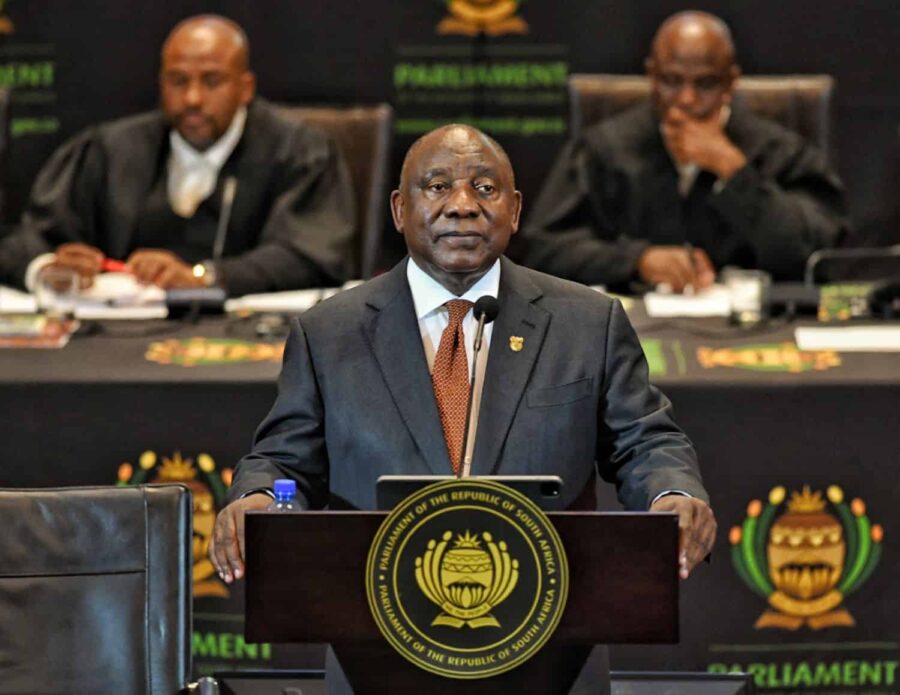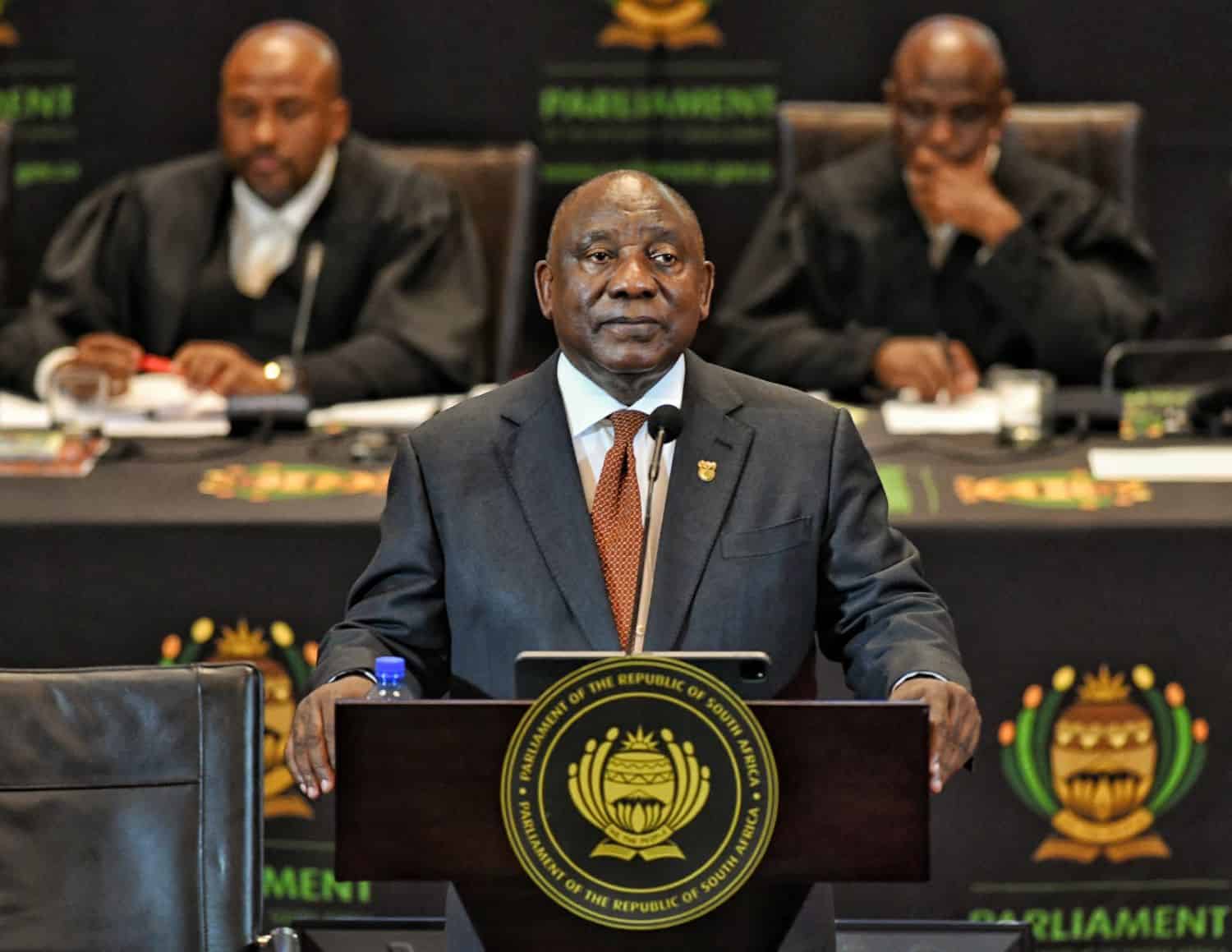
ANC dominates the new Government of National Unity Cabinet
Despite only making up 55% of the Government of National Unity, the ANC dominates its 10 other partners with almost 70% of cabinet positions.

Despite only making up 55% of the Government of National Unity (GNU), the African National Congress (ANC) dominates its 10 other partners with almost 70% of cabinet positions.
After weeks of negotiations, President Cyril Ramaphosa finally announced his 77-member National Executive for the seventh administration in a family meeting late on Sunday evening.
ELEVEN PARTIES IN THE GOVERNMENT OF NATIONAL UNITY
The 11 parties to the GNU are the African National Congress, Democratic Alliance, Patriotic Alliance, Inkatha Freedom Party, Good Party, Pan Africanist Congress of Azania, Freedom Front Plus, United Democratic Movement, Al Jama-ah, Rise Mzansi and the United Africans Transformation.
At 77 members, the latest cabinet in the largest in South Africa’s democratic history, up from 65 in the previous administration.
“In the course of the sixth democratic administration, we indicated our intention to reduce the number of portfolios in the National Executive. However, due to the need to ensure that the National Executive is inclusive of all the parties to the Government of National Unity, this has not been possible.
“In some instances, we have considered it necessary to separate certain portfolios to ensure that there is sufficient focus on key issues,” Ramaphosa said at the Union Buildings in Pretoria.
Breaking down the 77-member cabinet into ministers and deputy ministers, we see:
There were 32 ministers appointed (up from 30), made up of:
- African National Congress (ANC) – 20
- Democratic Alliance (DA) – 6
- Inkatha Freedom Party (IFP) – 2
- Patriotic Alliance (PA) – 1
- Freedom Front Plus (FF +) – 1
- Pan Africanist Congress (PAC) – 1
- GOOD – 1
From the above, one sees that only seven of the 11 GNU members were awarded minister positions.
Looking at the deputy ministers, this number increased from 35 to 43, with the breakdown being:
- African National Congress (ANC) – 33
- Democratic Alliance (DA) – 6
- Inkatha Freedom Party (IFP) – 2
- Al Jama-ah – 1
- United Democratic Movement (UDM) – 1
Only five of the 11 GNU members were awarded deputy minister positions.
In total, nine of the 11 GNU members were awarded at least one minister or deputy minister. The two parties to miss out were Rise Mzansi and the United Africans Transformation.
Meanwhile, Independent election analyst Michael Atkins highlighted – by means of a series of stats – that the biggest winners overall were clearly the ANC.
The party makes up just over 55% of the GNU composition, but received over 71% of the National Executive.

“A fair set of posts would have seen the DA with nine full Ministers, and the ANC with 17 [which is] on top of the fact that the ANC has the president and deputy-president,” said Atkins.
Note: The 77-member cabinet does not include (ANC) president Cyril Ramaphosa, nor ANC deputy-president Paul Mashatile, giving the ANC 55 overall.
FULL CABINET
- The Minister of Agriculture is John Steenhuisen.
- The Deputy Minister of Agriculture is Rosemary Nokuzola Capa.
- The Minister of Land Reform and Rural Development is Mzwanele Nyhontso.
- The Deputy Minister of Land Reform and Rural Development is Chupu Stanley Mathabatha.
- The Minister of Basic Education is Siviwe Gwarube.
- The Deputy Minister of Basic Education is Reginah Mhaule.
- The Minister of Communications and Digital Technologies is Solly Malatsi.
- The Deputy Minister of Communications and Digital Technologies is Mondli Gungubele.
- The Minister of Cooperative Governance and Traditional Affairs is Velenkosini Hlabisa.
- The Deputy Ministers of Cooperative Governance and Traditional Affairs are Dickson Masemola and Zolile Burns‐Ncamashe.
- The Minister of Defence and Military Veterans is Angie Motshekga.
- The Deputy Ministers of Defence and Military Veterans are Bantu Holomisa and Richard Mkhungo.
- The Minister of Electricity and Energy is Kgosientsho Ramokgopa.
- The Deputy Minister of Electricity and Energy is Samantha Graham.
- The Minister of Science, Technology and Innovation is Blade Nzimande.
- The Deputy Minister of Science, Technology and Innovation is Nomalungelo Gina.
- The Minister of Employment and Labour is Nomakhosazana Meth.
- The Deputy Ministers of Employment and Labour are Jomo Sibiya and Phumzile Mgcina.
- The Minister of Finance is Enoch Godongwana.
- The Deputy Ministers of Finance are David Masondo and Ashor Sarupen.
- The Minister of Forestry, Fisheries and the Environment is Dion George.
- The Deputy Ministers of Forestry, Fisheries and the Environment are Narend Singh and Bernice Swarts.
- The Minister of Health is Aaron Motsoaledi.
- The Deputy Minister of Health is Joe Phaahla.
- The Minister of Higher Education is Nobuhle Nkabane.
- The Deputy Ministers of Higher Education are Buti Manamela and Mimmy Gondwe.
- The Minister of Home Affairs is Leon Schreiber.
- The Deputy Minister of Home Affairs is Njabulo Nzuza.
- The Minister of Human Settlements is Mmamoloko Kubayi.
- The Deputy Minister of Human Settlements is Tandi Mahambehlala.
- The Minister of International Relations and Cooperation is Ronald Lamola.
- The Deputy Ministers of International Relations and Cooperation are Alvin Botes and Tandi Moraka.
- The Minister of Justice and Constitutional Development is Thembi Nkadimeng.
- The Deputy Minister of Justice and Constitutional Development is Andries Nel.
- The Minister of Mineral and Petroleum Resources is Gwede Mantashe.
- The Deputy Minister of Mineral and Petroleum Resources is Judith Nemadzinga‐Tshabalala.
- The Minister of Planning, Monitoring and Evaluation is Maropene Ramokgopa.
- The Deputy Minister of Planning, Monitoring and Evaluation is Seiso Mohai.
- The Minister of Police is Senzo Mchunu.
- The Deputy Ministers of Police are Polly Boshielo and Cassel Mathale.
- The Minister in the Presidency is Khumbudzo Ntshavheni.
- The Deputy Ministers in the Presidency are Nonceba Mhlauli and Kenneth Morolong.
- The Minister of Public Service and Administration is Mzamo Buthelezi.
- The Deputy Minister of Public Service and Administration is Pinky Kekana.
- The Minister of Public Works and Infrastructure is Dean Macpherson.
- The Deputy Minister of Public Works and Infrastructure is Sihle Zikalala.
- The Minister of Small Business Development is Stella Ndabeni-Abrahams.
- The Deputy Minister of Small Business Development is Jane Sithole.
- The Minister of Social Development is Sisisi Tolashe.
- The Deputy Minister of Social Development is Ganief Hendricks.
- The Minister of Sport, Arts and Culture is Gayton McKenzie.
- The Deputy Minister of Sport, Arts and Culture is Peace Mabe.
- The Minister of Tourism is Patricia De Lille.
- The Deputy Minister of Tourism is Maggie Sotyu.
- The Minister of Trade, Industry and Competition is Parks Tau.
- The Deputy Ministers of Trade, Industry and Competition are Zuko Godlimpi and Andrew Whitfield.
- The Minister of Transport is Barbara Creecy.
- The Deputy Minister of Transport is Mkhuleko Hlengwa.
- The Minister of Water and Sanitation is Pemmy Majodina.
- The Deputy Ministers of Water and Sanitation are David Mahlobo and Isaac Seitlholo.
- The Minister of Women, Youth and Persons with Disabilities is Sindisiwe Chikunga.
- The Deputy Minister of Women, Youth and Persons with Disabilities is Mmapaseka Steve Letsike.
- The Minister of Correctional Services is Pieter Groenewald.
- The Deputy Minister of Correctional Services is Lindiwe Nrshalintshali
